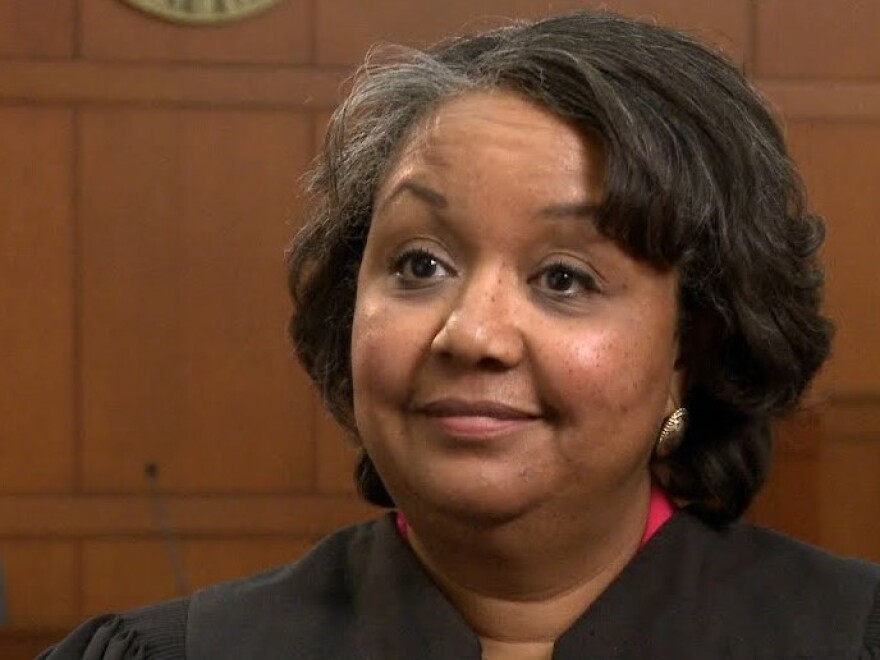The KCUR news staff presents the State of Kansas City series as a look ahead to 2020 on topics of importance to the region. Find the State of Kansas City report on other topics in the series as they are published each weekday, Jan. 6–Jan. 20. Follow coverage on these topics at KCUR.org and on 89.3 FM throughout the year.
Once again, Kansas City, Missouri, finds itself in the midst of a climb in homicides. According to police data, 2019 ended with 148 killings, a number very near to 151 homicides in 2017, which was the highest seen in decades. In Kansas City, Kansas, the homicide total rose slightly year over year, from 35 to 38.
Gun violence is prevalent, and Missouri’s loose gun laws are top of mind for many, including Kansas City Police Chief Rick Smith. Missouri Gov. Mike Parson gently backed new gun legislation that would mirror existing federal law, but he also denied that he further wants to restrict “law-abiding citizens’ right to bear arms.”
It’s not just fatal shootings sparking concern. There were almost 500 nonfatal shootings in Kansas City in 2019. The city has added detectives to its assault squad to try to solve more cases. Also, we’ll start to get an idea later this year of how well a program run out of the prosecutor’s office that offers intense, wrap-around services to gunshot victims is working.
While Kansas City police are poised to try out new tactics inspired by lessons learned from police Milwaukee and Tampa, Florida, their exact plans remain unclear.
The Department of Justice has taken notice, too. Last month, the DOJ announced it would intensify federal law enforcement resources in seven cities — Kansas City, Missouri, and Kansas City, Kansas, were among them.

This year, KCUR will dive into the communities’ efforts to curb the violence and scrutinize leading public safety officials as they navigate changes in leadership, continued violence and new approaches to a decades-old problem for the city.
WHY YOU SHOULD CARE
When you send your child to school or kiss your partner goodbye before work, you want to know that they will be safe. Kansas City’s violence, no matter where it’s concentrated, is Kansas City’s problem.
WHAT TO WATCH FOR
- Kansas City, Kansas, Police Chief: Kansas City, Kansas, will bring on a new police chief this year. Chief Terry Zeigler retired last fall amid ongoing scandals and calls from the community for his firing. In pending lawsuits, Zeigler has been accused of fostering and participating in racism and sexism within the KCKPD, where he served for three decades. Those issues speak to ongoing tensions between the department, which is predominantly white, and the community, which is one of the most diverse communities in the country.
- Jails: Both Jackson County and Kansas City are struggling with how to house inmates. The Jackson County jail downtown is dilapidated and needs replacing. Because of other issues, like reassessment and fixing the downtown courthouse following a flood, the county has been moving more slowly than many anticipated. The jail affects the city too. After ending an agreement with the county in 2019, Kansas City began housing its inmates and detainees in a patchwork system. The city canceled a contract with Heartland Center for Behavioral Health after detainees died and escaped. Jackson County is now accepting about 50 Kansas City prisoners, and city and county officials hope to work together this year to find a more permanent solution.
- Local Control: The Kansas City Police Department is asking the city for a $235 million budget for the coming fiscal year, a hike of almost $10 million. But unlike every other big city in America, the city council and mayor have little say about how the police department operates. Instead, the governor appoints a police commission that runs the department. This year the city, led by Mayor Quinton Lucas, will push state lawmakers to relinquish control and hand the KCPD back to the city for the first time since 1939. While the mayor and council want local control KCPD Chief Rick Smith wants the status quo.
- Transparency: Since her son was shot and killed by an Overland Park police officer, Sheila Albers has worked to change how law enforcement responds in similar situations. As a result, the Johnson County Police Academy has nearly doubled mental health and de-escalation training. Now, Albers is with State Rep. David Benson on a bill for the 2020 legislative session to bring more transparency and accountability after police shootings. It would require an outside agency to conduct the investigation and the release of records if there’s not a prosecution.
KEY PLAYERS
Quinton Lucas
Kansas City Mayor

Lucas says he’s willing to get “creative” to find ways to reduce violent crime. So far, that has meant new city ordinances and a lawsuit against an out-of-state gun manufacturer — the first of its kind nationwide in more than a decade.
William Barr
United States Attorney General

The Department of Justice is sending a “surge” of federal agents and dollars to combat violent crime on both sides of the state line. Details remain fuzzy, but the region could see about $10 million to fund more police and equipment. That’s on top of other DOJ programs, such as the Public Safety Partnership, which provides policing expertise to KCPD, and Project Safe Neighborhoods, which pays for extra federal prosecutors and anti-violence projects.
Julie Robinson
U.S. District Judge

Robinson, chief judge at the federal courthouse in Kansas City, Kansas, is overseeing litigation in a burgeoning scandal at a federal detention center in Leavenworth. More than 1,000 confidential phone calls between inmates and their attorneys were improperly recorded, and Robinson recently held the local U.S. Attorney’s office in contempt. Scores of prisoners could see their sentences reduced or erased, and two class-action lawsuits remain pending.
Kansas City Police Department Investigations Bureau
The Violent Crime Division and the Homicide Unit had a rather poor showing in 2019. Only 43% of the city’s 148 homicides were cleared and the clearance for non-fatal shootings was even worse. There are changes for 2020. Eight additional detectives are now assigned to homicide. There is a new major commanding the Violent Crime Division, and the U.S. Department of Justice has pledged $10 million and more federal agents to combat the surge in violent crime.
BY THE NUMBERS
0: The number of horses in the KCPD. A full-time mounted unit was established in 2006 with eight members but disbanded last year. Those mounted slots were handed over to the homicide unit.
1939: The year Kansas City lost local control of its police department.
683: The number of homicides Kansas City suffered in the last five years.
KEY DATES
May 1: The day the new KCPD police budget will go into effect. The department has requested about $15 million of additional funding, a nearly 6% increase. The KCPD budget calls for 30 more officers. We’ll see how many City Council will go for.
August: Jackson County hired a local group as its jail consultant. The county expects the first two phases of a four-phase process to be completed by August. The report will say why the county needs a new jail and what programs should be offered.
September: The FBI plans to release its 2019 nationwide crime stats. KCPD officials have said their goal is to get off the top 10 most violent cities list. But the date varies slightly from year to year.
Andrea Tudhope is a reporter at KCUR 89.3. Email her at andreat@kcur.org and follow her on Twitter @andreatudhope. Chris Haxel is a reporter for KCUR 89.3. Email him at chaxel@kcur.org, and follow him on Twitter @ChrisHaxel. Sam Zeff is KCUR's metro reporter. You can follow Sam on Twitter @samzeff.










